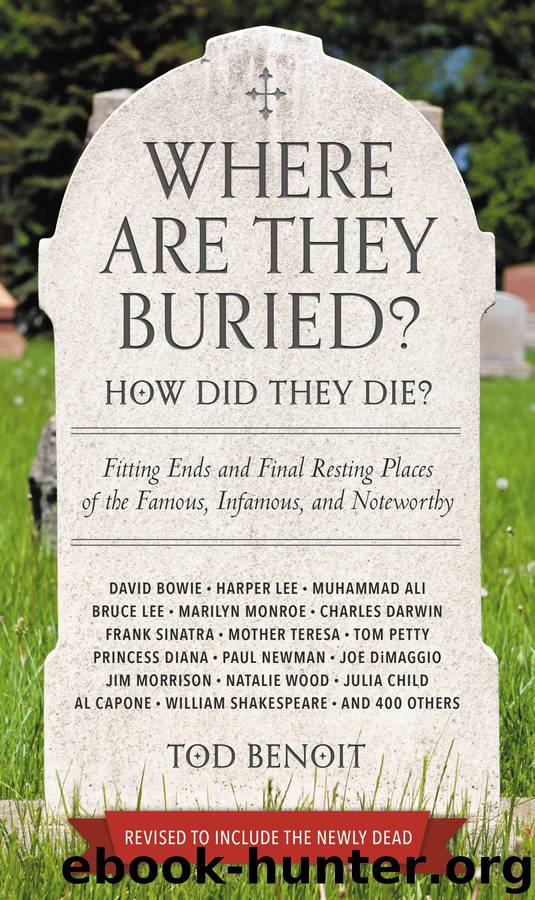Where Are They Buried? by Tod Benoit

Author:Tod Benoit
Language: eng
Format: epub
Publisher: Running Press
Published: 2019-03-25T16:00:00+00:00
Here he lies where he longed to be;
Home is the sailor, home from the sea,
And the hunter home from the hill.
HUNTER S. THOMPSON
JULY 18, 1937– FEBRUARY 20, 2005
HUNTER S. THOMPSON’S ATYPICAL writing career began when he contributed to an Air Force newspaper, a service he had entered as part of a parole agreement after a particularly wild youth, and one which he exited, by his own account, with “totally unclassifiable status.” Following the military stint he embarked on a career path that was rocky, to put it mildly; at Time magazine he was fired for spending his time typewriting entire F. Scott Fitzgerald works to better understand the author’s writing style; at the Middletown Daily Record in New York, he was let go after a violent altercation with the company’s candy machine; his tenure at a Brazilian media publication was terminated due to gross discrepancies on expense reports; and in 1961 he was canned from a treasured caretaking job at Big Sur Hot Springs after publishing a controversial piece about the area’s hard-drinking, pot-smoking subculture.
Hunter inevitably gravitated to the drug and hippie culture of San Francisco where he fell into living and partying with the notorious Hell’s Angels biker gang as a sort of hanger-on whom they tolerated. Their toleration turned to admiration once his 1965 magazine feature of their exploits hit the newsstands, but then devolved into contempt, as Hunter sought to further capitalize on their dead-end lifestyle by extrapolating the piece into a full-length book, Hell’s Angels: The Strange and Terrible Saga of the Outlaw Motorcycle Gang. Oblivious to their rising displeasure, Hunter remained in their midst as he struggled to script a climactic final scene for the book’s ending. Finally, tensions burst at a California roadhouse and his subjects demonstrated to him their idea for the last chapter by beating him within an inch of his life.
With the success of Hell’s Angels, Hunter and his wide-open writing style became highly sought after and, in 1970, he inadvertently upped the ante and ended up casting an entirely new genre—a mad journalistic style in which the correspondent himself plays a central role in the story. With his mind blown out on assorted recreational inebriants and the heat of a deadline for a piece about the Kentucky Derby bearing down, Hunter resorted to merely delivering torn-out pages from his notebook. “I was sure it was the last article I was ever going to do for anybody,” he recalled. Instead, the piece drew raves and was labeled a breakthrough in journalism, an experience the soon-to-be counterculture hero likened to “falling down an elevator shaft and landing in a pool of mermaids.” Gonzo journalism was born and Hunter’s heyday arrived.
In the next decade he perfected his acerbic mix of nonfiction writing and inserted himself into countless rambling essays and a handful of books that savagely chronicled the underbelly of American life and politics. In raw and sprawling satires such as Fear and Loathing in Las Vegas Hunter portrayed himself as a snarling maverick narrator whose beat was “the death of the American Dream.
Download
This site does not store any files on its server. We only index and link to content provided by other sites. Please contact the content providers to delete copyright contents if any and email us, we'll remove relevant links or contents immediately.
Annapurna by Maurice Herzog(3470)
Liar's Poker by Michael Lewis(3450)
A Forest Journey by John Perlin(3077)
Atlas Obscura by Joshua Foer(2962)
The Ogre by Doug Scott(2684)
Cuba by Lonely Planet(2635)
Photographic Guide to the Birds of Indonesia by Strange Morten;(2534)
The Splendid and the Vile by Erik Larson(2474)
Tokyo by Rob Goss(2432)
All Things Reconsidered by Bill Thompson III(2394)
Fatal Storm by Rob Mundle(2218)
A TIME OF GIFTS by Patrick Leigh Fermor(2206)
INTO THE WILD by Jon Krakauer(2201)
Trail Magic by Trevelyan Quest Edwards & Hazel Edwards(2184)
DK Eyewitness Top 10 Travel Guides Orlando by DK(2179)
Touching the Void by Joe Simpson(2130)
Top 10 Dubai and Abu Dhabi by DK Travel(2102)
Lonely Planet Australia by Lonely Planet(2084)
Abbey in America by Murray John A(2079)
